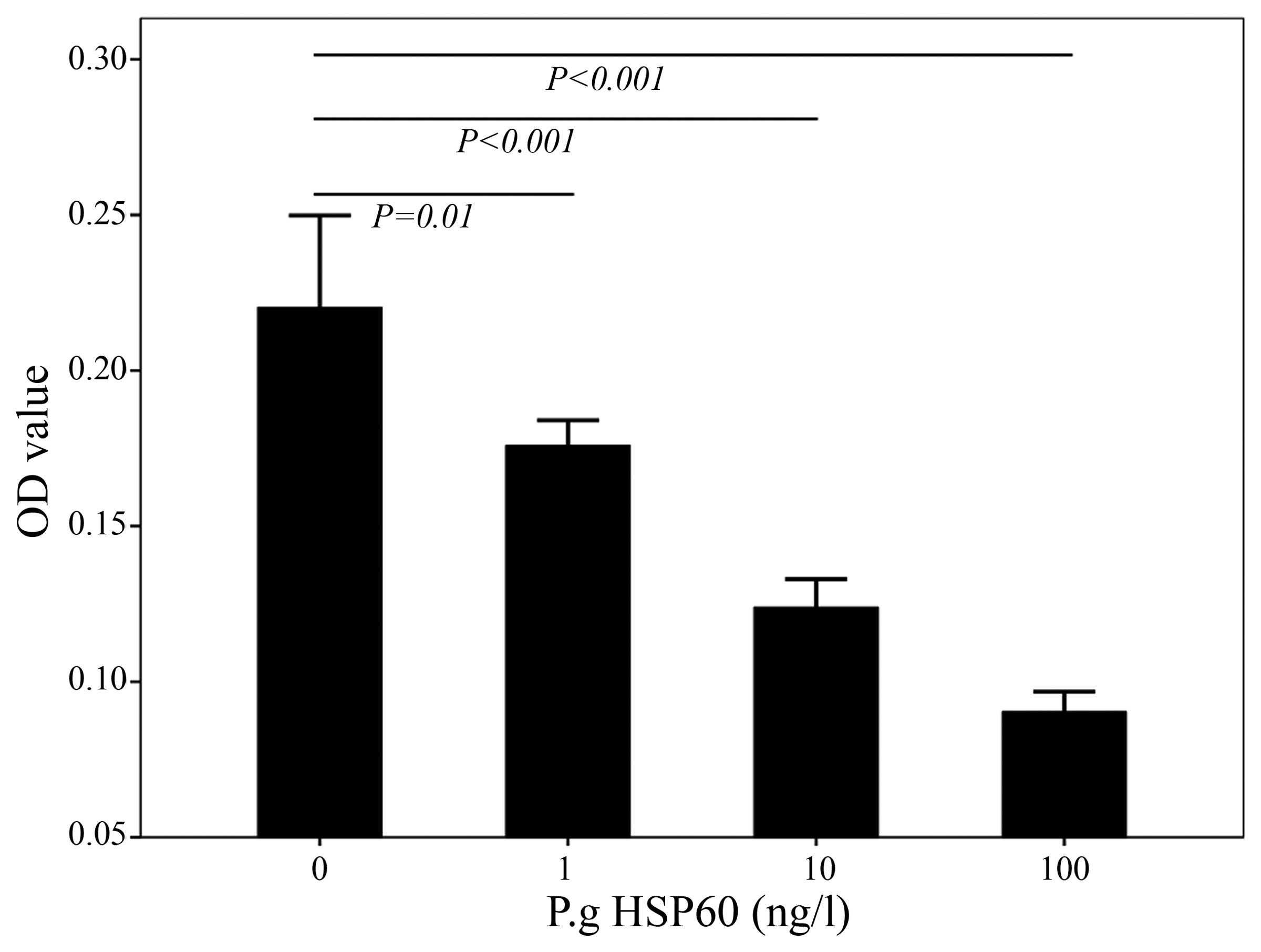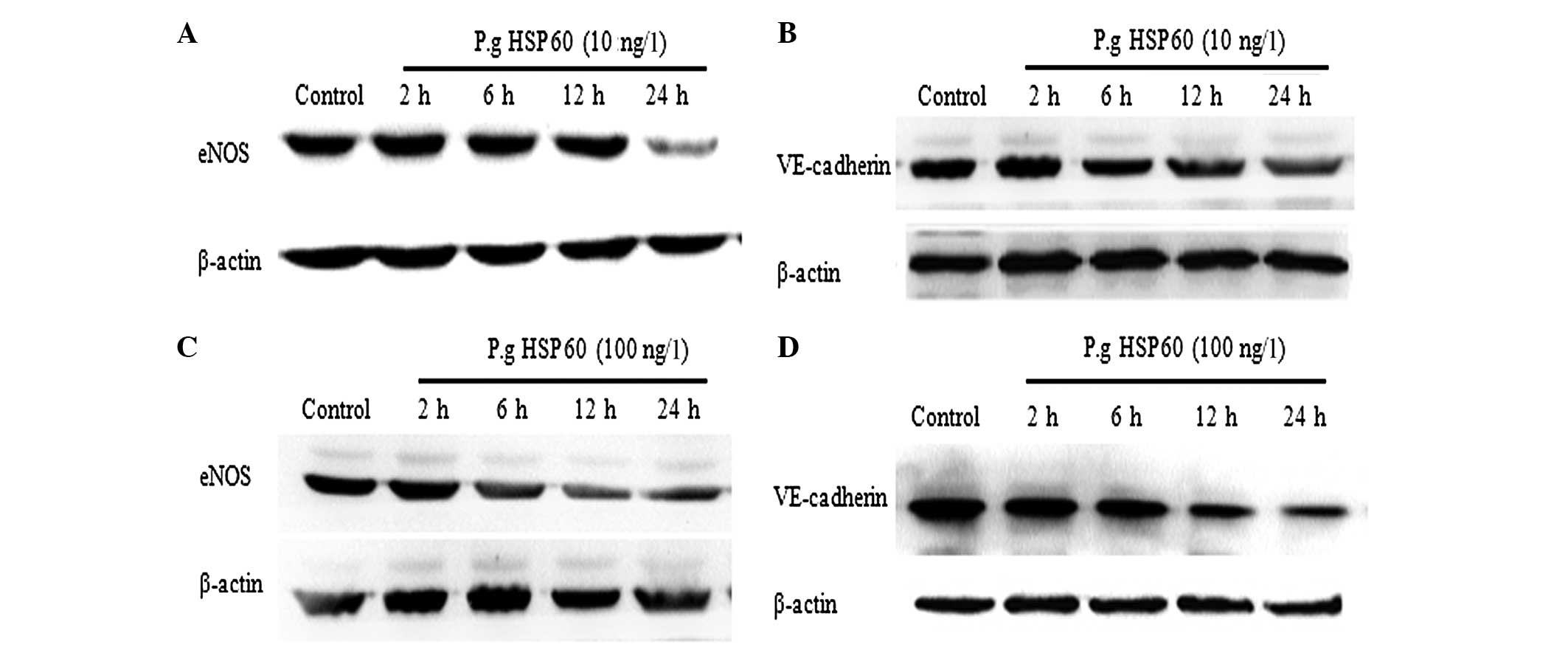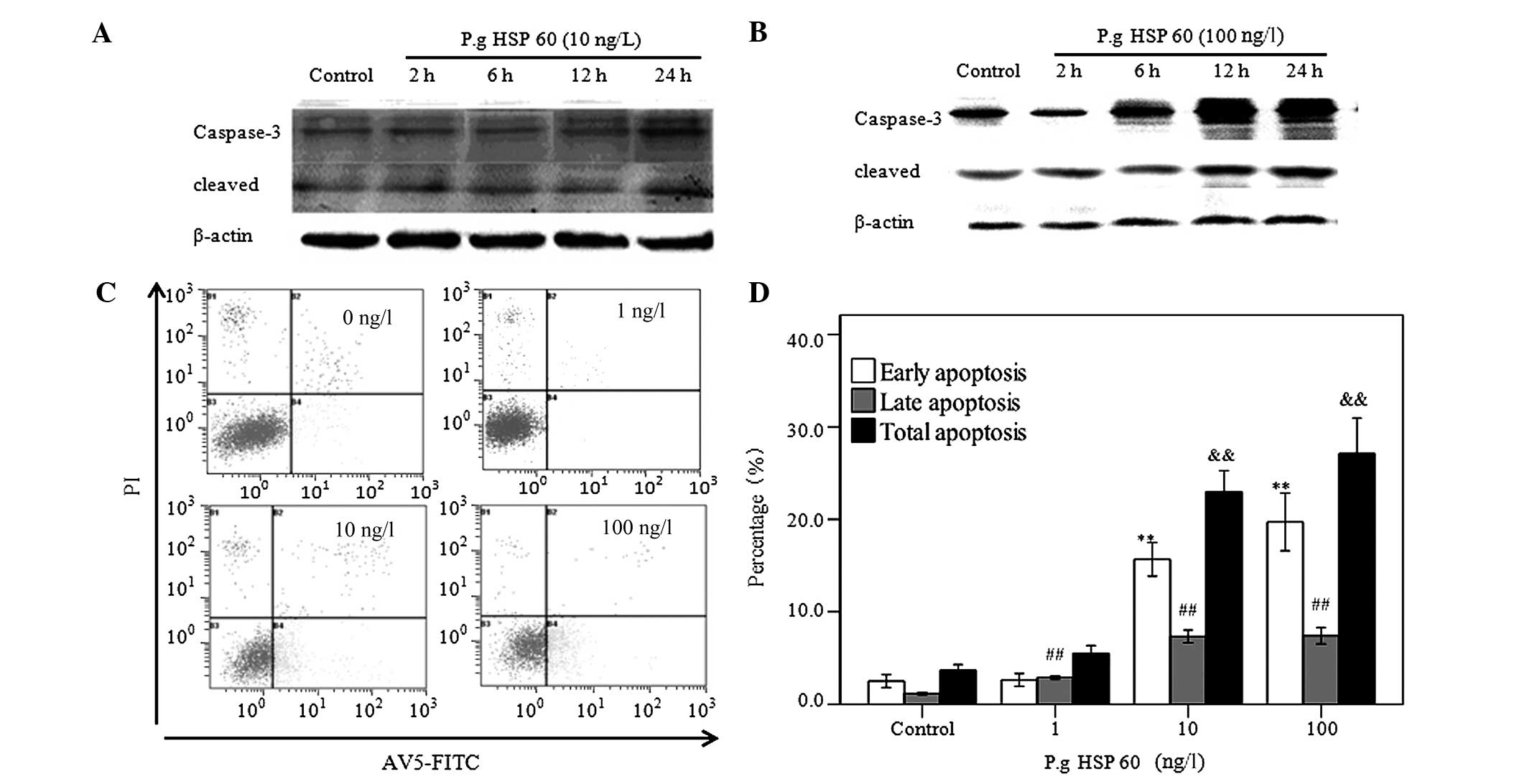|
1
|
Dietrich T, Jimenez M, Krall Kaye EA,
Vokonas PS and Garcia RI: Age-dependent associations between
chronic periodontitis/edentulism and risk of coronary heart
disease. Circulation. 117:1668–1674. 2008. View Article : Google Scholar : PubMed/NCBI
|
|
2
|
Bahekar AA, Singh S, Saha S, Molnar J and
Arora R: The prevalence and incidence of coronary heart disease is
significantly increased in periodontitis: A meta-analysis. Am Heart
J. 154:830–837. 2007. View Article : Google Scholar : PubMed/NCBI
|
|
3
|
Dietrich T, Sharma P, Walter C, Weston P
and Beck J: The epidemiological evidence behind the association
between periodontitis and incident atherosclerotic cardiovascular
disease. J Periodontol. 84(Suppl 4): S70–S84. 2013. View Article : Google Scholar : PubMed/NCBI
|
|
4
|
Tonetti MS and Van Dyke TE: working group
1 of the joint EFP/AAP workshop: Periodontitis and atherosclerotic
cardiovascular disease: Consensus report of the Joint EFP/AAP
Workshop on Periodontitis and Systemic Diseases. J Periodontol.
84(Suppl 4): S24–S29. 2013. View Article : Google Scholar : PubMed/NCBI
|
|
5
|
Forner L, Larsen T, Kilian M and Holmstrup
P: Incidence of bacteremia after chewing, tooth brushing and
scaling in individuals with periodontal inflammation. J Clin
Periodontol. 33:401–407. 2006. View Article : Google Scholar : PubMed/NCBI
|
|
6
|
Kinane DF, Riggio MP, Walker KF, MacKenzie
D and Shearer B: Bacteraemia following periodontal procedures. J
Clin Periodontol. 32:708–713. 2005. View Article : Google Scholar : PubMed/NCBI
|
|
7
|
Guntheroth WG: How important are dental
procedures as a cause of infective endocarditis? Am J Cardiol.
54:797–801. 1984. View Article : Google Scholar : PubMed/NCBI
|
|
8
|
Yumoto H, Chou HH, Takahashi Y, Davey M,
Gibson FC III and Genco CA: Sensitization of human aortic
endothelial cells to lipopolysaccharide via regulation of Toll-like
receptor 4 by bacterial fimbria-dependent invasion. Infect Immun.
73:8050–8059. 2005. View Article : Google Scholar : PubMed/NCBI
|
|
9
|
Kozarov EV, Dorn BR, Shelburne CE, Dunn WA
Jr and Progulske-Fox A: Human atherosclerotic plaque contains
viable invasive Actinobacillus actinomycetemcomitans and
Porphyromonas gingivalis. Arterioscler Thromb Vasc Biol.
25:e17–e18. 2005. View Article : Google Scholar : PubMed/NCBI
|
|
10
|
Darveau RP: Periodontitis: A polymicrobial
disruption of host homeostasis. Nat Rev Microbiol. 8:481–490. 2010.
View Article : Google Scholar : PubMed/NCBI
|
|
11
|
Miyakawa H, Honma K, Qi M and Kuramitsu
HK: Interaction of Porphyromonas gingivalis with low-density
lipoproteins: Implications for a role for periodontitis in
atherosclerosis. J Periodontal Res. 39:1–9. 2004. View Article : Google Scholar : PubMed/NCBI
|
|
12
|
Giacona MB, Papapanou PN, Lamster IB, Rong
LL, D'Agati VD, Schmidt AM and Lalla E: Porphyromonas
gingivalis induces its uptake by human macrophages and promotes
foam cell formation in vitro. FEMS Microbiol Lett. 241:95–101.
2004. View Article : Google Scholar : PubMed/NCBI
|
|
13
|
Khlgatian M, Nassar H, Chou HH, Gibson FC
III and Genco CA: Fimbria-dependent activation of cell adhesion
molecule expression in Porphyromonas gingivalis-infected
endothelial cells. Infect Immun. 70:257–267. 2002. View Article : Google Scholar : PubMed/NCBI
|
|
14
|
Nakamura N, Yoshida M, Umeda M, Huang Y,
Kitajima S, Inoue Y, Ishikawa I and Iwai T: Extended exposure of
lipopolysaccharide fraction from Porphyromonas gingivalis
facilitates mononuclear cell adhesion to vascular endothelium via
Toll-like receptor-2 dependent mechanism. Atherosclerosis.
196:59–67. 2008. View Article : Google Scholar : PubMed/NCBI
|
|
15
|
Jeong E, Lee JY, Kim SJ and Choi J:
Predominant immunoreactivity of Porphyromonas gingivalis
heat shock protein in autoimmune diseases. J Periodontal Res.
47:811–816. 2012. View Article : Google Scholar : PubMed/NCBI
|
|
16
|
Rajaiah R and Moudgil KD: Heat-shock
proteins can promote as well as regulate autoimmunity. Autoimmun
Rev. 8:388–393. 2009. View Article : Google Scholar : PubMed/NCBI
|
|
17
|
van Puijvelde GH, van Es T, van Wanrooij
EJ, Habets KL, de Vos P, van der Zee R, van Eden W, van Berkel TJ
and Kuiper J: Induction of oral tolerance to HSP60 or an
HSP60-peptide activates T cell regulation and reduces
atherosclerosis. Arterioscler Thromb Vasc Biol. 27:2677–2683. 2007.
View Article : Google Scholar : PubMed/NCBI
|
|
18
|
Craig EA, Gambill BD and Nelson RJ: Heat
shock proteins: Molecular chaperones of protein biogenesis.
Microbiol Rev. 57:402–414. 1993.PubMed/NCBI
|
|
19
|
Ford PJ, Gemmell E, Hamlet SM, Hasan A,
Walker PJ, West MJ, Cullinan MP and Seymour GJ: Cross-reactivity of
GroEL antibodies with human heat shock protein 60 and
quantification of pathogens in atherosclerosis. Oral Microbiol
Immunol. 20:296–302. 2005. View Article : Google Scholar : PubMed/NCBI
|
|
20
|
Jeong E, Kim K, Kim JH, Cha GS, Kim SJ,
Kang HS and Choi J: Porphyromonas gingivalis HSP60 peptides
have distinct roles in the development of atherosclerosis. Mol
Immunol. 63:489–496. 2015. View Article : Google Scholar : PubMed/NCBI
|
|
21
|
Zhang X, He M, Cheng L, Chen Y, Zhou L,
Zeng H, Pockley AG, Hu FB and Wu T: Elevated heat shock protein 60
levels are associated with higher risk of coronary heart disease in
Chinese. Circulation. 118:2687–2693. 2008. View Article : Google Scholar : PubMed/NCBI
|
|
22
|
Lewthwaite J, Owen N, Coates A, Henderson
B and Steptoe A: Circulating human heat shock protein 60 in the
plasma of British civil servants: Relationship to physiological and
psychosocial stress. Circulation. 106:196–201. 2002. View Article : Google Scholar : PubMed/NCBI
|
|
23
|
Van Dyke TE and van Winkelhoff AJ:
Infection and inflammatory mechanisms. J Clin Periodontol. 40(Suppl
14): S1–S7. 2013. View Article : Google Scholar : PubMed/NCBI
|
|
24
|
Schenkein HA and Loos BG: Inflammatory
mechanisms linking periodontal diseases to cardiovascular diseases.
J Periodontol. 84(Suppl 4): S51–S69. 2013. View Article : Google Scholar : PubMed/NCBI
|
|
25
|
Kebschull M, Demmer RT and Papapanou PN:
‘Gum bug, leave my heart alone!’ - epidemiologic and mechanistic
evidence linking periodontal infections and atherosclerosis. J Dent
Res. 89:879–902. 2010. View Article : Google Scholar : PubMed/NCBI
|
|
26
|
Kajiyama H, Kikkawa F, Khin E, Shibata K,
Ino K and Mizutani S: Dipeptidyl peptidase IV overexpression
induces up-regulation of E-cadherin and tissue inhibitors of matrix
metalloproteinases, resulting in decreased invasive potential in
ovarian carcinoma cells. Cancer Res. 63:2278–2283. 2003.PubMed/NCBI
|
|
27
|
Andrukhov O, Steiner I, Liu S, Bantleon
HP, Moritz A and Rausch-Fan X: Different effects of
Porphyromonas gingivalis lipopolysaccharide and TLR2 agonist
Pam3CSK4 on the adhesion molecules expression in endothelial cells.
Odontology. 103:19–26. 2015. View Article : Google Scholar : PubMed/NCBI
|
|
28
|
Hobbs AJ, Higgs A and Moncada S:
Inhibition of nitric oxide synthase as a potential therapeutic
target. Annu Rev Pharmacol Toxicol. 39:191–220. 1999. View Article : Google Scholar : PubMed/NCBI
|
|
29
|
Busse R and Mülsch A: Calcium-dependent
nitric oxide synthesis in endothelial cytosol is mediated by
calmodulin. FEBS Lett. 265:133–136. 1990. View Article : Google Scholar : PubMed/NCBI
|
|
30
|
Smadja DM, Bièche I, Helley D, Laurendeau
I, Simonin G, Muller L, Aiach M and Gaussem P: Increased VEGFR2
expression during human late endothelial progenitor cells expansion
enhances in vitro angiogenesis with up-regulation of integrin
alpha(6). J Cell Mol Med. 11:1149–1161. 2007. View Article : Google Scholar : PubMed/NCBI
|
|
31
|
Franco CA, Mericskay M, Parlakian A,
Gary-Bobo G, Gao-Li J, Paulin D, Gustafsson E and Li Z: Serum
response factor is required for sprouting angiogenesis and vascular
integrity. Dev Cell. 15:448–461. 2008. View Article : Google Scholar : PubMed/NCBI
|
|
32
|
Baluk P, Fuxe J, Hashizume H, Romano T,
Lashnits E, Butz S, Vestweber D, Corada M, Molendini C, Dejana E,
et al: Functionally specialized junctions between endothelial cells
of lymphatic vessels. J Exp Med. 204:2349–2362. 2007. View Article : Google Scholar : PubMed/NCBI
|
|
33
|
Potter MD, Barbero S and Cheresh DA:
Tyrosine phosphorylation of VE-cadherin prevents binding of p120-
and beta-catenin and maintains the cellular mesenchymal state. J
Biol Chem. 280:31906–31912. 2005. View Article : Google Scholar : PubMed/NCBI
|
|
34
|
Marsden VS, O'Connor L, O'Reilly LA, Silke
J, Metcalf D, Ekert PG, Huang DC, Cecconi F, Kuida K, Tomaselli KJ,
et al: Apoptosis initiated by Bcl-2-regulated caspase activation
independently of the cytochrome c/Apaf-1/caspase-9 apoptosome.
Nature. 419:634–637. 2002. View Article : Google Scholar : PubMed/NCBI
|
|
35
|
Degterev A, Boyce M and Yuan J: A decade
of caspases. Oncogene. 22:8543–8567. 2003. View Article : Google Scholar : PubMed/NCBI
|

















